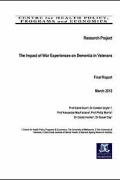The impact of war experiences on dementia in veterans (2012)

Final report March 2012
This project was funded by the Department of Veterans’ Affairs to investigate the relationship between post-traumatic stress disorder (PTSD) and dementia in veterans. Recently, links have been made in the medical literature between PTSD and the incidence of dementia, with epidemiological evidence that the odds of developing dementia are 1.7 to 2 times greater in veterans with a diagnosis of PTSD. These findings from analyses of USA Veterans’ Affairs data led us to pose research questions about dementia and PTSD in Australian veterans. No Australian large scale data bases with variables on PTSD diagnoses and dementia diagnoses were available to replicate the USA analyses for older Australian veterans. However, a community survey of dementia, the EACHD evaluation survey, included veteran status as a survey item and provided the basis for an opportunity to address questions related to the issue.
We aimed to answer the research questions:
- What is the profile of behavioural and psychological symptoms of dementia (BPSD) in Australian veterans?
- Is the profile of BPSD different in veterans and non-veterans?
- Is the profile of BPSD different in veterans with PTSD and veterans without PTSD?
DVA's response to the report
The Department of Veterans’ Affairs (DVA) contracted The Centre for Health Policy Programs and Economics, The University of Melbourne, to investigate the relationship between Posttraumatic Stress Disorder (PTSD) and dementia in a sample of Australian veterans. The research was funded under DVA’s Applied Research Program.
DVA is responsible for providing and purchasing health and aged care services worth over $5 billion a year for some 240,000 clients across Australia in the veteran community. Of this health treatment population:
- 44% are aged 85 years and over;
- clients who are aged 85 years and over also make up 1 in 4 (or 26 per cent) of all Australians in this age group; and
- clients who are in residential aged care make up over 15% of all residents.
Given the age structure of the health treatment population and the increasing likelihood of living with dementia in the very old age group, dementia is and will continue to be a significant priority for the veteran community and DVA.
DVA has considered the research report and notes that this is the first Australian study to explore the relationship between symptoms of dementia and PTSD. The research indicated that dementia symptoms were different in veterans and non-veterans. Additionally, veterans with PTSD had more significant behavioural and psychological symptoms of dementia than veterans without PTSD.
A limitation of the study was the small sample and further studies are needed to replicate this finding and understand why specific behavioural and psychological symptoms of dementia are more prevalent among veterans than non-veterans.
In April, the Government made a significant announcement about aged care, proposing reforms to the way in which aged care is financed to ensure that older Australians will continue to be able to access the care that they need, when they need it. This includes greater availability of care places, especially community care, and more funding for dementia care.
The package includes one veteran specific initiative, More Support for Veterans in Commonwealth Home Care Packages and Residential Aged Care. The initiative aims to improve access to appropriate care for veterans with an accepted mental health condition who receive a home care package or are in residential care. It will start in July 2013 and be funded as $96.6 million over five years net spending.
The mental health conditions to be covered by these arrangements include post traumatic stress disorder, depressive disorder, anxiety disorder, alcohol dependence or abuse and adjustment disorder. The full list of conditions will be determined before the initiative starts.
Dementia will continue to the considered by the Department in its policy development for both mental health and aged care.